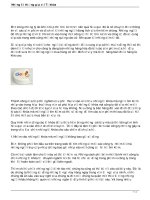NHUNG LOI HAY GAP VOI DONG TU.1. MR
Bạn đang xem bản rút gọn của tài liệu. Xem và tải ngay bản đầy đủ của tài liệu tại đây (21.48 KB, 2 trang )
Page 1 of 2
www.englishpractice.com – Learn and practice English online.
Common Errors with Verbs - Part I
Incorrect: He asked had we taken our food.
Correct: He asked if we had taken our food. OR He asked whether we had taken
our food.
Incorrect: I am not sure will I have time.
Correct: I am not sure if I will have time.
Incorrect: I asked whether had she any letters for me.
Correct: I asked whether she had any letters for me.
Explanation
Indirect yes/no questions are usually introduced by if or whether. Note that in an
indirect question we put the subject before the verb.
Incorrect: He said that he saw her last year.
Correct: He said that he had seen her last year.
Incorrect: I could not meet him because he went out before I arrived.
Correct: I could not meet him because he had gone out before I arrived.
Incorrect: He got angry even before I said a word.
Correct: He got angry even before I had said a word.
Incorrect: There I met a man who was my classmate ten years ago.
Correct: There I met a man who had been my classmate ten years ago.
Incorrect: This was going on for a long time.
Correct: This had been going on for a long time.
Explanation
These are examples of the failure to use past perfect tense when the time of one
past action is more past than that of another.
Incorrect: I will call you when dinner will be ready.
Correct: I will call you when dinner is ready.
Incorrect: I will write after I returned.
Correct: I will write after I return.
Incorrect: When I will go to New York I will meet him.
Correct: When I go to New York, I will meet him.
Explanation
www.englishpractice.com – Learn and practice English online.
Page 2 of 2
When the principal clause is in the simple future tense, the subordinate clause
should be in the simple present tense. Note that when a subordinate adverb
clause begins the sentence, we separate it from the rest of the sentence by a
comma.
Incorrect: If I would have done this I would have been wrong.
Correct: If I had done this I would have been wrong.
Explanation
In a Type 3 Conditional sentence we use had + past participle in the if clause and
would have + past participle in the result clause.
Incorrect: She knows to knit.
Correct: She knows how to knit.









